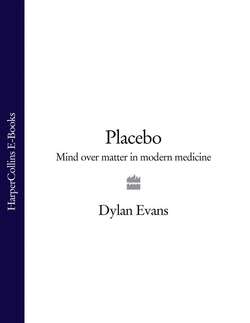Читать книгу Placebo: Mind over Matter in Modern Medicine - Dylan Evans - Страница 23
PLACEBOS AND MENTAL DISORDER
ОглавлениеWhat about mental disorders? Can placebos cure diseases of the mind as well as diseases of the body? Unfortunately, the available evidence is once again quite weak. Despite the oft-repeated claims in the medical literature about ‘well-documented’ placebo effects in anxiety and depression, there are no properly controlled studies showing that people with these conditions do better when given a placebo than when deprived of one. In the absence of such studies, we can still look for relevant evidence by sifting through other data and comparing one set of trials with another, but we should bear in mind that the conclusions we draw on this basis must always be treated with a degree of caution. Until someone comes along and does a proper study involving a no-treatment group, it would be wrong to say that the placebo response has been clearly demonstrated for anxiety and depression.
Although there are a few controlled trials comparing placebos to no treatment with patients suffering from various anxiety disorders, these suffer from methodological flaws and do not provide very strong evidence. There are other kinds of evidence, however, which – while by no means conclusive – do provide some basis for suspecting that placebos can reduce anxiety. One study, for example, looked at the effect of tablet colour in the treatment of anxiety states.16 In 1970, a group of researchers based at the University of Newcastle upon Tyne signed up forty-eight patients who had been diagnosed as suffering from anxiety states, and divided them into three groups. All of the patients received a course of oxazepam, which is a cousin of diazepam (Valium), but the pills given to each group were dyed with a different colour – red, yellow and green. The colours were switched around after a week, and then switched once more for the third week, so that each group tried each colour. Anxiety levels were monitored both subjectively (by self-assessment forms) and objectively (by the doctors – who were unaware of which colour pill the patient was taking at any particular time).
When the results came in, some interesting trends were apparent in the data. The colour of the tablets seemed to have a subtle influence on the effect of the medication. In particular, green tablets tended to be most effective in reducing anxiety, and yellow the least effective. Anxiety manifests itself in a number of ways, from psychological symptoms such as worry and irritability to bodily signs such as palpitations, and for all of these phenomena green tablets were superior to the red or yellow ones. The differences were small, though, and did not reach statistical significance, except in one case – phobic symptoms. Phobia is one of the most common manifestations of anxiety, and green tablets were twice as effective as red or yellow ones in reducing phobic symptoms – even though the tablets contained exactly the same drug.
When the effect of a drug varies systematically according to colour of the tablet in which it is administered, it is a fair bet that the condition being treated is placebo-responsive. The only way that something as insubstantial as colour can affect a medical condition is by way of the patient’s mind. The 1970 study on tablet colour does therefore suggest that some anxiety disorders at least may be placebo-responsive. Interestingly, the same study also pointed to a possible placebo effect in depression. This is not particularly surprising in itself, since anxiety and depressive symptoms often occur together, but the curious thing was that the best colour for treating each type of symptom was different. While anxiety levels were reduced most by green tablets, depressive symptoms responded best to yellow tablets. Next best was green, while red was worst for both anxiety and depression. The researchers who conducted the study were at a loss to explain this result. Was it due to chance? Or did it point to certain differences in the patients’ beliefs about the effects of tablet colour? Intrigued, they called for further research on the topic. None came.
